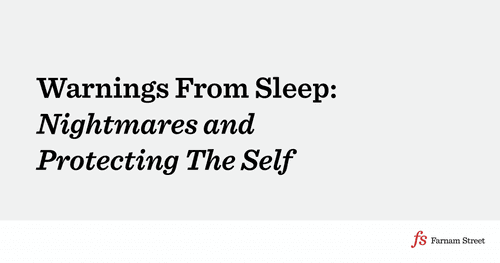Explore the World's Best Ideas
Join today and uncover 100+ curated journeys from 50+ topics. Unlock access to our mobile app with extensive features.
Trauma and nightmares
Nightmares appear to be more common in those who have intense reactions to stress. When our time awake is frightening or remains unpressed, the sleeping brain may produce horrible images to awaken a sleeper.
The more trauma we have in our lives, the more likely we are to experience anxiety and nightmares.
121
344 reads
The effects of trauma on sleep
If an action against the threat is irrelevant or impossible - as it would be if the trauma happened long ago - then emotion-coping efforts like dreaming may be useful to get on with our lives.
If the threat will be encountered repeatedly, such as abuse, then waking problem-solving action is necessary.
79
212 reads
Nightmares
Nightmares happen later in sleep when dreams are longest, and the content is bizarre and emotional. Nightmares wake the sleeper into full consciousness and clear memory of the dream. It temporarily relieves the negative emotion.
As we develop the skills for managing negative emotions while we are awake, nightmares will reduce in frequency.
95
257 reads
IDEAS CURATED BY
A good night sleep and a helathy morning routine is what I work on constantly.
Katherine L.'s ideas are part of this journey:
Learn more about health with this collection
How to make good decisions
How to manage work stress
How to manage email effectively
Related collections
Similar ideas
7 ideas
Why We Dream What We Dream
psychologytoday.com
9 ideas
Why Do We Dream? The Role of Dreams and Nightmares
healthline.com
6 ideas
Read & Learn
20x Faster
without
deepstash
with
deepstash
with
deepstash
Personalized microlearning
—
100+ Learning Journeys
—
Access to 200,000+ ideas
—
Access to the mobile app
—
Unlimited idea saving
—
—
Unlimited history
—
—
Unlimited listening to ideas
—
—
Downloading & offline access
—
—
Supercharge your mind with one idea per day
Enter your email and spend 1 minute every day to learn something new.
I agree to receive email updates

